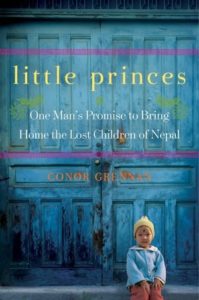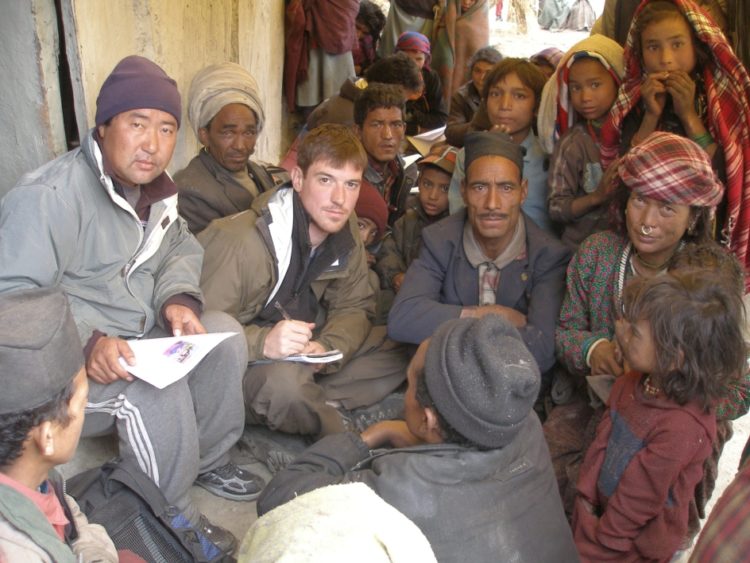In Conor’s words:
Who inspires me: The parents in the remote areas of Nepal who work so hard to provide a life for their children.
Best advice: Try something that you don’t think you’ll like – you could end up surprising yourself.
Conor Grennan is the first to admit his trip to Nepal to volunteer at an orphanage was never meant to make him a hero. “I really went out there to impress people,” he laughs. Little did he know, the experience would end up in him embroiled in a dangerous bid to stamp out child trafficking and reunite stolen children with their families.
Had you told Conor that’s what would happen when he first swaggered into Little Princes orphanage as 29 year old awash with plans to travel the world, he would have scoffed at you.
The experience would end up in him embroiled in a dangerous bid to stamp out child trafficking.
Shattered preconceptions
Things didn’t go quite to plan from the moment Conor entered Little Princes in 2004. “I’d never been to an orphanage before and I’d never really had anything much to do with kids before so I had no idea what to expect,” he says. “Before you go you’ve got an image in your mind and for me the image was it would be like black and white and there’d be soft music playing and I’d go in and there’d be orphans in the corner and I’d go over and pet their head or something … and soothe them and make their life have meaning, and then I’d just go and read a book.”
As Conor arrived at the orphanage with this image in mind, an avalanche of kids descended on him in a tangle of limbs and squeals of laugher. This was a teeming, squirming, hilarious and boisterous mass of life. Conor didn’t know what had hit him.
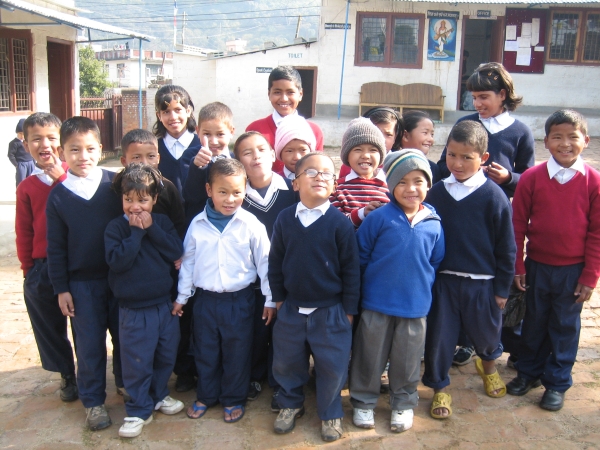
Falling in love
It wasn’t long before Conor realised the immensity of what he’d signed up for. In this tiny orphanage, he and a handful of other volunteers were 100 percent responsible for the children. There was no-one else to defer to, no knock off time. The kids were their responsibility. Conor found he was actually needed. And, to his surprise, he realised he was enjoying the experience. “I was really genuinely happy there,” he says. “It was a really simple life where you weren’t distracted by things. It was great to be in a place where you’re not envying or coveting something. Happiness or discontent comes from seeing things you’d like to have or like to be and can’t have and all sudden you’re in a little village where there is basically nothing – that was an extraordinary life experience for me.”
And of course there were the kids. “When I’d heard people talk about the orphanages and how wonderful the kids are I thought they were full of it,” Conor says. “I thought you just had to say that or you’d sound like a jerk. Then I really got to know them. I didn’t fall in love with them because they were sweet, I fell in love with them because they were people – they were hilarious and they were frustrating and they were really annoying sometimes and they were funny sometimes and thoughtful sometimes.”
“I didn’t fall in love with them because they were sweet, I fell in love with them because they were people.”
Surprise visitor
While he’d loved the experience, by the end of Conor’s three months volunteering stint he was ready for the rest of his 12-month journey of world travel. But, breaking the first rule of volunteering, he promised the orphans he’d return.
His world travels were everything he dreamed they’d be – jammed with adventure and action and experience. But, remembering his promise, he decided to return to Nepal before heading home to start ‘real life’ in America.
It was during this return trip that a woman visited the orphanage. Clad in rags, and obviously from a rural area, the woman began asking after her two children. “She came down the path dressed like something out of National Geographic,” Conor said. “And when she started asking after her kids I felt bad for her. I was thinking you’re in the wrong pace, this isn’t like a school, it’s an orphanage – the kids here don’t have parents.” But the woman pointed to two children on the terrace and insisted they were her children. As they stood before her, there was no denying it. They were her spitting image.
Shock revelation
Through a translator, the woman revealed how she’d come from a remote area of Nepal – a place reachable via an arduous trek through the mountains, with no electricity, no running water, no cars and mud huts for homes. Here, deep in the mountains, Maoist rebels had invaded, and started seeking out children to join their ever-swelling army. They would storm schools, kill the teacher and kidnap the students.
Frightened for their children’s lives, families flocked to a man who wandered through the region offering to save their children by escorting them to Kathmandu and putting them through school. Families rushed to enrol their kids, selling their possessions, their homes, their land in a bid to pay the rate required to ensure the lives of their children.
Little did the families know, the man was a child trafficker. He’d steal the children, dump them in homes in the seething metropolis of Kathmandu and hide them where their rural parents, who’d never before travelled, had little to no hope of ever finding them.
He’d steal the children, dump them in homes in the seething metropolis of Kathmandu and hide them where their rural parents.
Child trafficking rife
The same man later discovered he could make still more money by selling the kids as domestic slaves. And later still he and others like him raked in bigger dollars through adoption agencies who’d offer ‘orphans’ to the west in exchange for around $20,000US, including a $5000US donation to the orphanage. Traffickers would forge death certificates for trafficked children’s parents so they could be sold as orphans.
After the adoption racket was uncovered, the traffickers set their sights on volunteer tourists. They’d send out so-called orphans to find western tourists and invite them back to their orphanages. Appalled to see the kids living in destitution, the well-meaning visitors would ask how they could help and start sending money from home. These ‘orphanages’ had Facebook pages and websites and looked legitimate, yet the money went straight to the pockets of child traffickers.
Traffickers would forge death certificates for trafficked children’s parents so they could be sold as orphans.
Seven lost children
Reeling from the information they were discovering Conor and fellow volunteer at Little Princes, Farid Ait-Mansour, knew they had to do something. They started by taking the two boys to visit their mother regularly, as she had no money to look after them. One day, after lumbering for two to three hours on a bus through Kathmandu’s street to visit, Conor discovered the mother living with another seven children. The same trafficker who’d stolen the women’s children had dumped them with her. “You have to understand that if powerful man tells a woman from a rural area to do something, they do it,” Conor says.
Realising the mother could not feed the other children, Conor started bringing them food. He couldn’t fit them into Little Princes but he’d found them a home with another reputable orphanage – the Umbrella Foundation.
Umbrella Foundation staff were due to pick up the children, aged from 6 to about 12, when, in 2006, the Maoists invaded Kathmandu. “Everything closed until while the Maoists tried to overthrow the King,” Conor says. “It got dangerous very quickly. Soldiers started shooting protestors. I left the country along with everyone. I came back to US and watched it all unfold on CNN.”
After weeks of violence the Maoists overthrew the King and Conor received an email from a contact at the Umbrella Foundation. They’d arrived to collect the seven children a day too late. The traffickers had reached them first and kidnapped them. Again these kids disappeared into the teeming back alleys of Kathmandu.
Helpless
“At that point I felt pretty helpless,” Conor says. “I had two choices – to say wow how tragic and isn’t it horrible and a lot of bad stuff happens in the world or I could take personal responsibility,” he says. “It’s not like I’d been looking for opportunity to start a not-for-profit or that I even wanted to go back and change the world – I was done with Nepal. But if I didn’t go back there wasn’t anybody who was going to find those kids.”
Enormity of problem
After spending a summer forming a not-for-profit and fundraising to pay for the search, Conor returned to Nepal with no idea where to start searching for the lost children. He had photos of the kids and simply started asking until he came across a man on the child welfare board who agreed to help. He knew of several illegal orphanages and agreed to take Conor there in search of the children.
On the back of the man’s motorbike they tore through the backstreets, up a nondescript back alley to screech to a half at a battered metal door. Pounding of the door, the child welfare board member demanded entry, screaming at the man who answered it and forcing his way in. Inside they discovered a dark room filled with about 20 kids, heads shaven, lice-ridden and hungry.
Conor scanned their gaunt faces. The seven kids he was looking for weren’t among them. The welfare board member prepared to leave, intent on searching the next illegal orphanage. But Conor stared at the kids. He couldn’t just leave them. “What are you going to do?” the child welfare board member asked. “We don’t have the resources to care for them – at least here they might eat.”
“I was just stunned,” Conor says. “That was emotionally exhausting – seeing all those kids and realising how huge this problem was, was just overwhelming.”
Luck strikes
After visiting several such places, and becoming increasingly disheartened, Conor heard from a woman who ran another volunteer organisation who believed she may have spotted one of the girls among the seven children.
Conor bused to the village where she’d been sighted, but as he roamed the streets he realised it was useless. She could be anywhere. Shaking his head at his own naivety for coming, Conor couldn’t believe it when he looked up and saw her on the street.
Within the next few months he’d found six of the seven children.
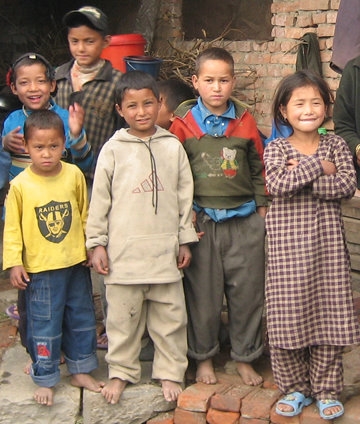
New home
In the meantime Conor and Farid had started a new house to home more trafficked children in Kathmandu, next door to the Umbrella Foundation. They called it Next Generation Nepal. They soon rescued another 20 kids and realised they would need to try to find their families. But they’d been stolen from one of the most remote regions on earth. Conor had no desire to go there. It would be dangerous for a start. He didn’t even know if news of the Maoist ceasefire had reached the remote mountain villages. But no-one else was willing to travel in search of the parents.
Mountain quest
Conor eventually convinced a Nepalese man to join him and together they hired an airplane to reach one of the remote villages. Stepping into the village, Conor felt as though he’d entered another world. “I’d never seen anything like it,” he said. “I just didn’t know the world looked like this. It’s just mountains, no roads or bikes or cars. It’s like going back in time.”
Although they’d obtained written permission from the Maoists to visit, Conor remained worried about attack. He was also concerned about the traffickers, who had so much to lose by Conor telling the families about the child trafficking racket.
Amassing a team of helpers to join them and help carry the supplies they’d need, Conor began a 10-day journey on foot, pressing still deeper into the mountains.
Discovering parents
As he scrambled down one particular steep mountain-side Conor injured his knee and had to rest for the day. But he couldn’t stay for long, lest the winter snow make the return trip impossible. Forging on, they came across a village where they sat on the ground outside a mud hut as people gathered to stare at them.
Showing the village elder a photo of some of the kids from Little Princes, the man recognised a face and called forward a couple – the parents of one of the Little Princes children. After telling them, through an interpreter, what had become of their child, the parents wept and wept, relieved to hear he was healthy but devastated at what he’d endured.
“These parents loved their kids more than anything else,” Conor says. “They were trying do what was best for their kids.” Finding these parents would be the first in a string of discoveries throughout the mountains.
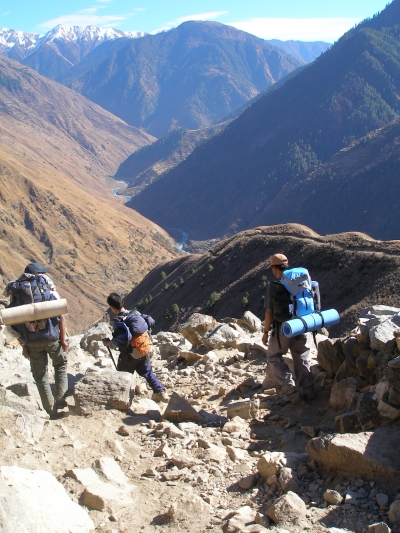
Joyous news
“It was so fricken hard to walk up and over these mountains to find a family but when we did – it was easily a highlight,” Conor says. In one village the parents of a boy, Jagreed, with whom Conor had particularly enjoyed bantering, came forward. Conor was confused. Jagreed thought his parents were dead. He had the death certificates. Yet here they were before him.
“That was unbelievable, and also kind of strange,” Conor says. “I couldn’t just call home to tell this boy. I knew I’d have this information for weeks. I had all these letters that parents had written to their kids. And knowing I was going to take them home to the kids was amazing. That moment of being able to share with them, that was unbelievable.”
Reuniting families
After that first trip to the mountains, Conor and his team helped the younger children from Little Princes and Next Generation Nepal return to their parents. The older kids wanted to study in the city so they returned on scholarship. The oldest one is now in graduate school studying to become a dentist. Jagreed has become a lab technician.
As the Conor and the Next Generation Nepal team discovered more and more trafficked kids, the numbers of children at Next Generation began to swell, forcing Conor to open still more homes to house them. But they soon realised they wanted to close homes, not open them, and reunite trafficked kids with their families. While today they have around 20 kids in a ‘transit’ home, they aim to return them to their families within a month of rescue.
So far they’ve reconnected some 550 kids with their families. Yet there’s no easy way of doing this. Teams have to put on a backpack and trek into the mountains to look for the parents.
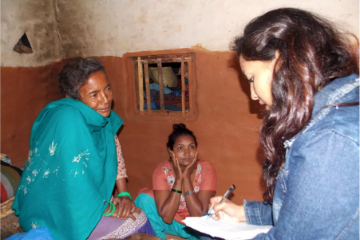
Inspired by children
After three years since he’d first come to Nepal, Conor was confident Next Generation Nepal was operating well and he decided to return to America in 2007, where he now works as dean of student at the New York School of business. Yet he remains in charge of fundraising for Next Generation Nepal and holds a position on its board. He keeps in contact daily with Next Generation and visits when he can. And, while he is now married and with his own kids, the lost children of Nepal remain at the front of his mind. Their smiles, their thirst for life, their spirit in the face of what they’ve endured, continue to inspire him.
Get involved…
Support the work: You can support Next Generation Nepal’s efforts to reunite trafficked children with their families by making a donation at the website www.nextgenerationnepal.org.
Read the story: Conor has written a wonderfully inspiring and highly entertaining book about his experience, titled Little Princes: One Man’s Promise to Bring Home the Lost Children of Nepal. It’s written in a gorgeously funny and self-deprecating manner, and recounts the full story of Conor’s work to reunite the lost children of Nepal with their parents. I highly recommend it. 